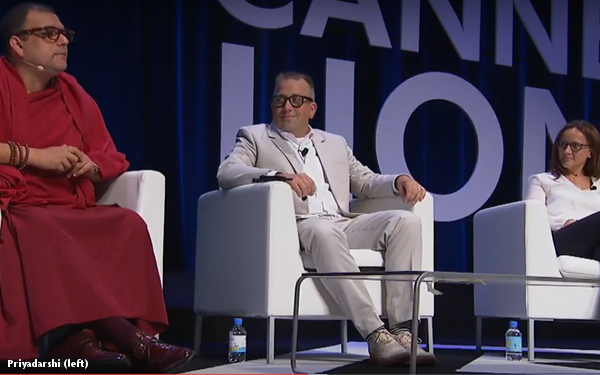Commentary
Cannes Opens By Posing Life Or Death Debate For AI-Enabled Marketing
- by Joe Mandese @mp_joemandese, June 19, 2017

The Cannes Festival of Creativity got off on an ethical note this morning by asking some questions that go well beyond brand marketing and into the heart, soul and brain of the most fundamental aspects of humanity, including life and death.
Citing a recent MIT project exploring the use of artificial intelligence in autonomous self-driving cars, Buddhist monk and MIT Media Lab Director of the Ethics Initiative Tenzin Priyadarshi illustrated how consumers and brand marketers are approaching human questions that go well beyond simple brand choices.
He said MIT asked a group of consumers to make a choice to save a group of pedestrians including children and pregnant women in a crosswalk of “self-destructing” the car and its driver.
“Surprisingly, most of the people chose the option that the car should self-destruct,” he said, adding,” And then they said they would not buy that car.”
The insight illustrates a fundamental dilemma for the application of data and AI in future product and brand marketing scenarios that humans of all kinds -- consumers, brands, agencies and technology companies -- will need to consider, Priyadarshi said on the Media Lions panel organized and moderated by Havas Global Head of Marketing Innovation Jason Jercinovic.
“There’s a tremendous gap that still needs to be crossed over where we talk about completely autonomous driving,” Priyadarshi continued, adding, “but there are certain kinds of decisions that we are not clear about who the agency should be -- meaning, who should take responsibility for it.”
Another panelist,Astrid Boutaud, global procurement communication at Sanofi, said the rapid evolution of AI and the application of consumer data will force many brand marketers to rethink how they collect and apply consumer data.
Processes and guidelines that evolved from classic CRM (consumer relationship management) or social media behaviors, may not be rigorous enough when applied to new forms of AI-enabled marketing, she said.
“It is true now that AI is blurring the lines again,” she said, adding, “Robots should always work and be programmed for the benefits for humanity. That’s common sense, but it’s always good to remind us about this.”
















